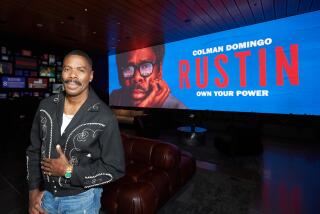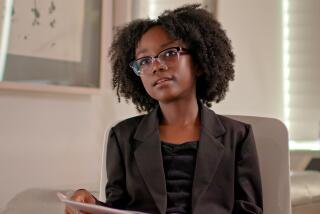‘The Great Debaters’
Opponents found it easy to underestimate the 1930s debate team of Wiley College, a small, all-black institution in a remote corner of Texas, but they did so at their peril. The same will likely hold true for those who underestimate the new film on the Wiley phenomenon, “The Great Debaters.”
Because it is so old-school Hollywood, with a weakness for standard moments and pat situations, “The Great Debaters” initially comes off as easily dismissible. Largely saving it from that fate is the presence and ability of Denzel Washington, who costars with Forest Whitaker and directs from Robert Eisele’s script. Working hard on both sides of the camera, Washington has grafted his intensity onto this production, giving it a kind of backbone it would not otherwise have.
Though some of the key characters in “Debaters” are composites and some of the debates it features likely never took place, the essential story of the film is both remarkable and true. Under the leadership of a professor named Melvin B. Tolson, later a well-known poet, Wiley did take the college debating world by storm during the 1930s despite its small size and the pervasive racism of the day. Though it’s not in the film, Wiley even defeated mighty USC in 1935.
Washington plays Tolson, and his first classroom appearance is striking. He strides into the room, leaps up onto a table and recites the first few “I am the darker brother” lines from Langston Hughes’ “I, Too, Sing America.” In period clothes and hairdo, Washington not only looks the academic part, he brings an intriguing air of danger to the role of a firebrand who is determined to advance social justice in both the classroom and society at large.
Tolson is especially passionate about debate, which he considers to be “blood sport.” He’s fussy about whom he picks for his four-person team and has his own mind-game techniques for turning them into winners.
“The Great Debaters” focuses on the year 1935 and three Tolson debaters, two of whom are frankly composites, though inspired by real Wiley students. Samantha Booke (Jurnee Smollett) has transferred to Wiley with the hopes of being the school’s first female debater. Free spirit Henry Lowe (Nate Parker) is smart and fearless, but he’s not sure he wants to debate or even be in college at all.
The third student is based on a real person, James Farmer Jr., who went on to found the Congress of Race Equality in 1942 and be a key player in the civil rights movement.
In “Debaters,” we meet Farmer, played by Denzel Whitaker (no relation) when he is the youngest debater on the team, all of 14 years of age. His teenage crush on Miss Booke is one of the film’s more schematic elements, but his conflicts with his learned father, the college’s president (the quietly powerful Forest Whitaker), are considerably more substantial.
Also unexpectedly powerful are the places and times when the Wiley students and faculty have to confront the pervasive racism of the day, whether it’s stumbling on a lynching or having to endure humiliation at the hands of mulish white people.
Because the real-life Tolson was also an organizer for the Southern Tenant Farmers Union, the film also throws a bracing whiff of Depression-era class warfare at the audience.
It is “The Great Debaters’ ” unwillingness to downplay the harsh reality of prejudice that gives this film its authenticity. These scenes and moments may have been seen before, but they are presented with real fierceness, as are the debates themselves. It can be a shock to realize at moments that the issues that plagued America 70 years ago are still very much with us today.
“The Great Debaters.” MPAA rating: PG-13 for depictions of strong thematic material, including violence and disturbing images, and for language and brief sexuality. Running time: 2 hours, 3 minutes. In general release.
More to Read
From the Oscars to the Emmys.
Get the Envelope newsletter for exclusive awards season coverage, behind-the-scenes stories from the Envelope podcast and columnist Glenn Whipp’s must-read analysis.
You may occasionally receive promotional content from the Los Angeles Times.







